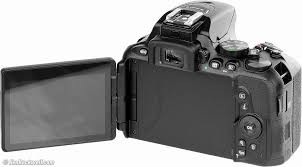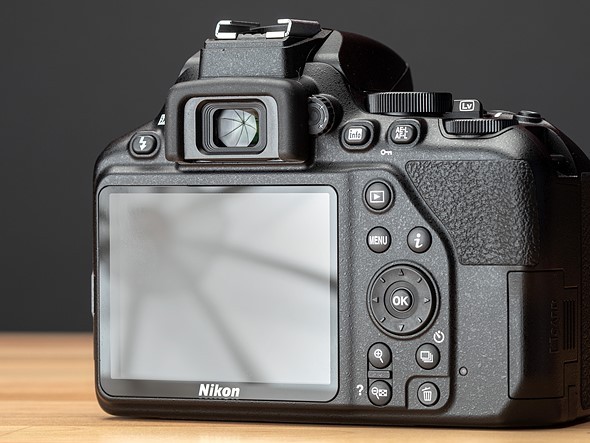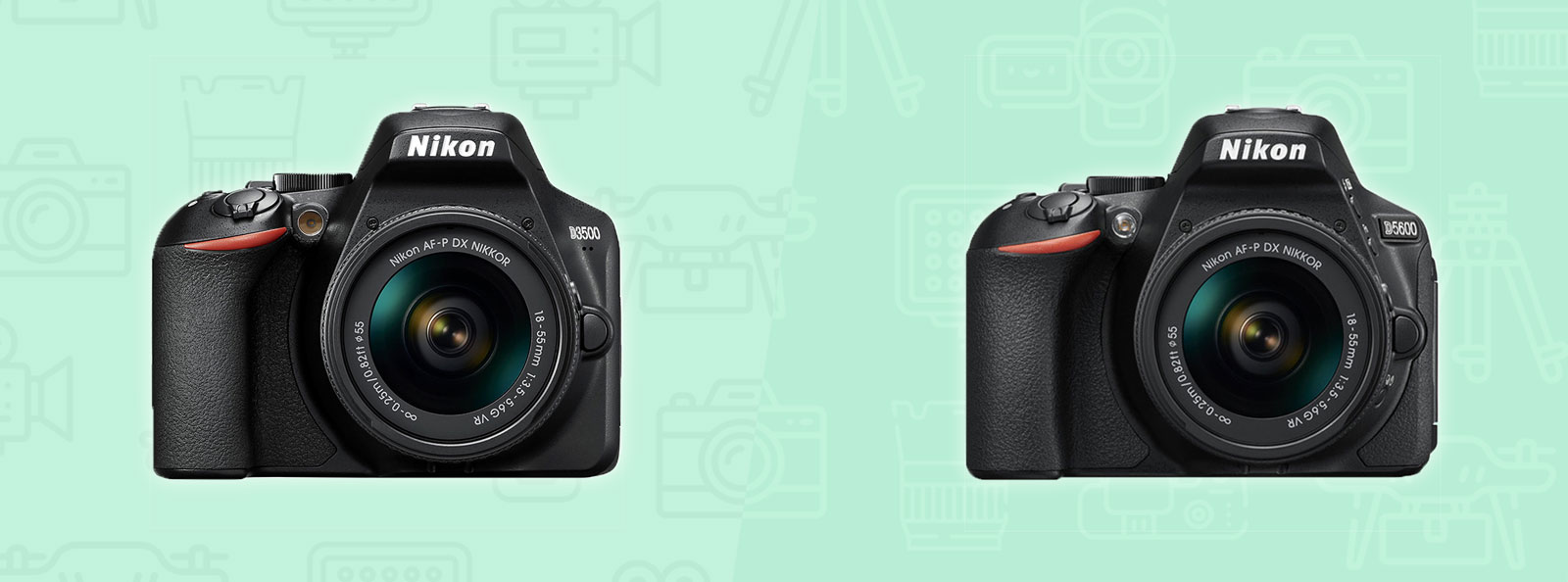Nikon D3500 vs. Nikon D5600: The Complete Comparison
In this article, we break down the differences between the Nikon D3500 and the Nikon D5600, so you can decide which camera is the best fit for you.
The Nikon D3500 and Nikon D5600 are both entry-level DSLR cameras priced for photographers looking to get into the DSLR field at a low price point. When deciding on which camera would be best for your needs, it can be hard to discern which one has the best features, so we did the work for you!
Check out the key details and our in-depth comparison to see which of these beginner cameras would be the best fit.
Key Details at a Glance:
Here are the side-by-side specs of the Nikon D3500 and the Nikon D5600:
| Nikon D3500 | Nikon D5600 | |
| Price | New: $396.95, Used: ~$300 (Body Only) | New: $596.95, Used: ~$520 (Body Only) |
| Release Date | 8/29/2018 | 11/10/2016 |
| Sensor | 24MP APS-C CMOS | 24MP APS-C CMOS |
| Viewfinder | Optical | Optical |
| Articulating LCD Screen | No | Yes |
| LCD Screen Size | 3 | 3.2 |
| Viewfinder Resolution | 2359k | 2359k |
| Lens Type | Nikon F Mount | Nikon F Mount |
| Continuous Shooting Speed | 5.0 fps | 5.0 fps |
| Video Resolution | 1920×1080 | 1920×1080 |
| Weather sealed | No | No |
| Image Stabilization | No | No |
| Color Depth | Not Tested | 24.1 |
| Dynamic Range | Not Tested | 14.0 |
| Low Light ISO | Not Tested | 1306 |
| Battery Life | 1550 | 820 |
| Time Lapse Recording | No | Yes |
| Touchscreen | No | Yes |
| Selfie Friendly LCD | No | Yes |
| Wireless Connection | No | Yes |
| Bluetooth Connection | Yes | Yes |
| Microphone Port | No | Yes |
| AE Bracketing | No | Yes |
| Smartphone Remote | Yes | Yes |
| Built-in Flash | Yes | Yes |
| External Flash | Yes | Yes |
| Lenses Available | 305 | 305 |
| Dimensions | 124x97x70mm | 124x97x70mm |
| Weight | 365g | 465g |
In-Depth Comparison
Both the Nikon D3500 and Nikon D5600 are entry-level DSLR cameras, but at different price points and release dates, there are advantages and disadvantages for each model.
Looking at the specs can help provide a better idea of which may be the best choice, but an in-depth comparison explains how these features function within the camera’s usage. The main differences between the Nikon D3500 and Nikon D5600 can be found in their design, battery life, video features, and connectivity features.
Design
The Nikon D3500 and Nikon D5600 have similar physical designs, as both of them are compact DSLR bodies. Both cameras have the same dimensions, 124x97x70mm, but the Nikon D3500 is 100g lighter, only weighing 365g. While the body designs are nearly identical, the Nikon D3500 holds an advantage in weight.
The Nikon D3500 and Nikon D5600 are both equipped with LCD screens, and the Nikon D3500’s screen is 3’’ while the Nikon D5600 is 3.2’’. Along with a slightly bigger size, the Nikon D5600 has a fully articulating LCD screen, which allows it to be used from many different angles and can come in handy when used for selfies or vlogging.

Image via Ken Rockwell
Neither the Nikon D3500 or the Nikon D5600 is weather-sealed, so they aren’t equipped for harsh weather conditions. Both cameras incorporate a hot shoe feature, allowing for external flash options, as well as built-in flash features.
Overall, the designs are similar, but the Nikon D5600 has significant advantages with its fully articulating LCD screen, especially for photographers who rely on being able to see the screen from different angles.
Battery Life
Both the Nikon D3500 and the Nikon D5600 have pretty impressive battery lives, and can last over 500 shots, but the Nikon D3500 has the upper hand when it comes to battery life. The Nikon D3500 can last for 1,550 shots, while the Nikon D5600 can last for 820.
With a 730 shot advantage, the Nikon D3500 is the better choice for photographers who are looking for a long lasting battery.
Image Quality & Performance
As far as beginner-level DSLR cameras go, the Nikon D3500 and the Nikon D5600 perform well against their competitors, yet each brings their own advantages to the entry-level field.
Image Example from the Nikon D5600:

Image via Digital Camera World
The Nikon D3500 features 11 autofocus points, clustered in the middle of the field, which works well if your subject is not at the edge of your frame. The Nikon D5600 ups the number of points to 39 autofocus points, giving it an advantage over the Nikon D3500.
Image Example from the D3500:

Image via DPReview
Both cameras forgo the Anti-Aliasing filter, which gives the cameras the ability to collect finer detail in their images, with the risk of added moire in some light settings. Getting the hang of a camera with no AA filter can be an adjustment, but it does add the ability for higher image quality.
Connectivity & Image Transfer
The Nikon D3500 and Nikon D5600 both have built-in Bluetooth connections, which allows for instant image transfer between devices. However, the Nikon D5600 takes it a step further and includes WiFi connection to speed up and make image transfer even easier.
Neither the Nikon D3500 or the Nikon D5600 have a GPS feature. Both cameras do have the ability to be controlled remotely through a smartphone, which makes it easy to get creative while shooting.
Video
Both cameras have 1920×1080 video resolution at 60fps, so the Nikon D3500 and Nikon D5600 can shoot basic video, but are not made to be video cameras. With significant design advantages, however, the Nikon D5600 is the better choice for users planning to rely on the video function.

Image via DPReview
The Nikon D5600 has an external microphone port, unlike the Nikon D3500 which only has an internal mic, and this allows for the option to have better sound quality. The Nikon D5600 also has a fully articulating LCD screen, which can be manipulated easily for video footage, including flipped for selfies and vlog-style videos.
Final Thoughts
Both the Nikon D3500 and the Nikon D5600 are entry-level DSLR cameras that fit a lower budget, which makes them solid options for anyone wanting to get into the DSLR world. By choosing one of these cameras, any photographer would be able to get into the DSLR without shelling out too much at first.
The Nikon D3500 comes at a significantly lower price point, so if price is a deciding factor, this camera is probably the best choice. Along with the price, the Nikon D3500 has a longer battery life and weighs less, so it’s a good choice for photographers planning on doing long shoots.
The Nikon D5600 has the upper hand in several categories, including the autofocus system, LCD screen design, WiFi connection, and video features. With a fully articulating LCD screen, the Nikon D5600 works better for photographers and videographers wanting to easily shoot at different angles.
Overall, the Nikon D3500 is a great option for those with a lower budget, but the Nikon D5600 outshines in features for those willing to go up a bit in price.

